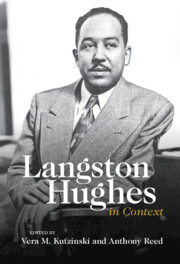Book contents
- Langston Hughes in Context
- Langston Hughes in Context
- Copyright page
- Contents
- Contributors
- Abbreviations
- Introduction
- Part I Singing America
- Chapter 1 Langston Hughes, Chicago, and Modernism
- Chapter 2 Jazz, Performance, and Modernist Embodiment in Langston Hughes’s Early Writing
- Chapter 3 His Ways with White Folks
- Chapter 4 Love at a Distance in Selected Letters by Langston and Carrie Hughes
- Chapter 5 Langston Hughes’s 1930s Short Fiction
- Chapter 6 Langston Hughes and Simple
- Chapter 7 Langston Hughes’s Famous Books, Ebony Magazine, and the Politics of Civil Rights in Biographies for the Young
- Chapter 8 Rural Black Masculinity and the Blues in Not without Laughter
- Chapter 9 From the Sublime to the Grotesque
- Chapter 10 Coalitional Aesthetics
- Chapter 11 Langston Hughes’s Translingual Poetics and Pedagogy
- Part II The Global Langston Hughes
- Part III Afterlives
- Index
Chapter 8 - Rural Black Masculinity and the Blues in Not without Laughter
from Part I - Singing America
Published online by Cambridge University Press: 10 November 2022
- Langston Hughes in Context
- Langston Hughes in Context
- Copyright page
- Contents
- Contributors
- Abbreviations
- Introduction
- Part I Singing America
- Chapter 1 Langston Hughes, Chicago, and Modernism
- Chapter 2 Jazz, Performance, and Modernist Embodiment in Langston Hughes’s Early Writing
- Chapter 3 His Ways with White Folks
- Chapter 4 Love at a Distance in Selected Letters by Langston and Carrie Hughes
- Chapter 5 Langston Hughes’s 1930s Short Fiction
- Chapter 6 Langston Hughes and Simple
- Chapter 7 Langston Hughes’s Famous Books, Ebony Magazine, and the Politics of Civil Rights in Biographies for the Young
- Chapter 8 Rural Black Masculinity and the Blues in Not without Laughter
- Chapter 9 From the Sublime to the Grotesque
- Chapter 10 Coalitional Aesthetics
- Chapter 11 Langston Hughes’s Translingual Poetics and Pedagogy
- Part II The Global Langston Hughes
- Part III Afterlives
- Index
Summary
In the 1930 novel Not without Laughter, Langston Hughes represents Black life in the Midwest through the experiences of Sandy Rodgers and his family in small-town Stanton, Kansas (a stand-in for Hughes’s childhood home of Lawrence, Kansas). Much of the criticism on Not without Laughter focuses on the influences of Sandy’s grandmother and aunts, but this chapter centers his father, Jimboy. While he rarely instructs Sandy on how to be a man, Jimboy models a Black blues masculinity that draws together multiple aspects of early twentieth-century American culture. By reading Jimboy within the novel’s Midwestern cultural and historical context, this chapter foregrounds him as a consequential figure within both the novel and Sandy’s life. Jimboy’s demeanor, musicality, and mobility suggest how Sandy might learn to cope with life in the modern Midwest – notably, however, in ways that do not align with the conventionally respectable aspirations of his female relatives.
- Type
- Chapter
- Information
- Langston Hughes in Context , pp. 83 - 93Publisher: Cambridge University PressPrint publication year: 2022

